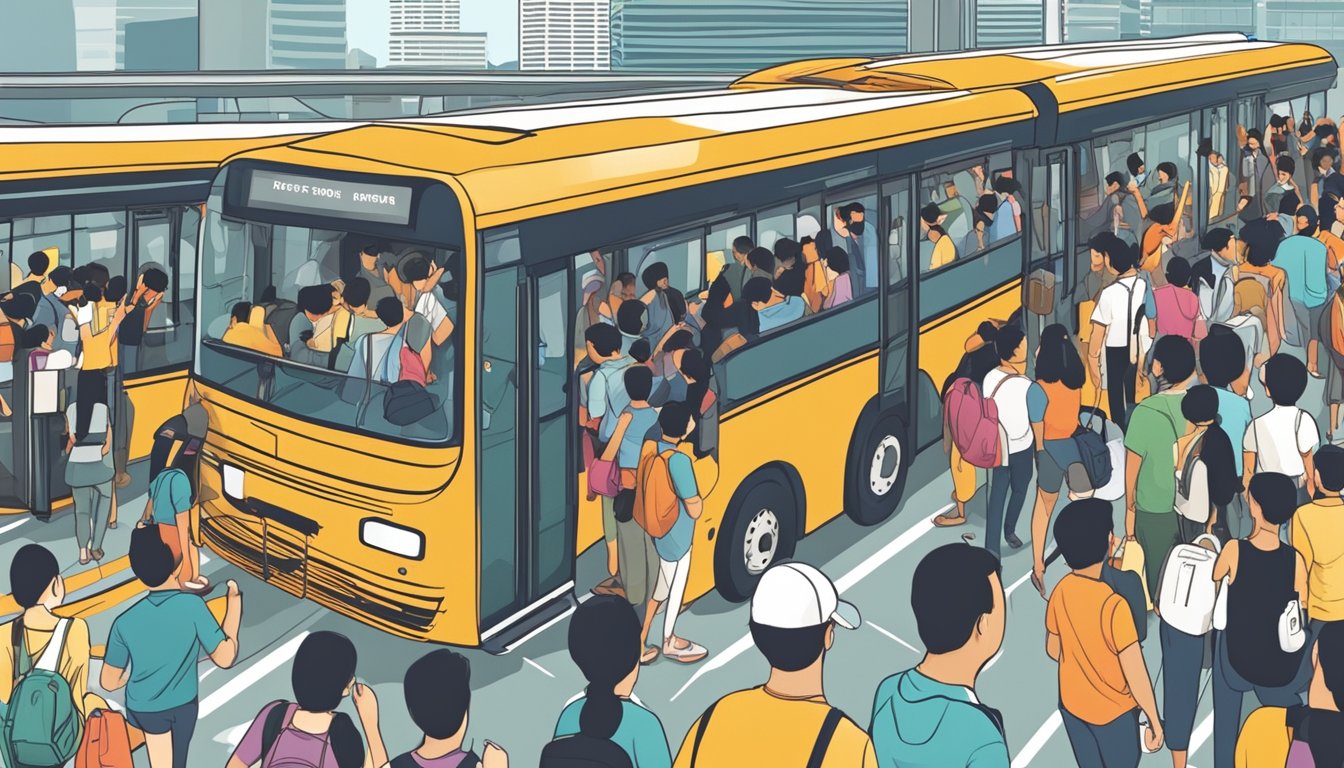Saving money can be a challenge, especially in a city like Singapore where the cost of living is relatively high. However, with the right strategies and mindset, it is possible to save money without sacrificing your quality of life. This article will provide tips and techniques for saving money in Singapore, covering topics such as setting financial goals, effective budgeting, smart shopping, reducing household bills, leveraging public transportation, and dining and entertainment.

One of the most important steps to saving money is setting financial goals. This involves identifying your short-term and long-term financial objectives, such as saving for a down payment on a house or building an emergency fund. Once you have established your goals, you can create a budget that allocates your income towards achieving them. Effective budgeting is a crucial component of saving money, as it allows you to track your spending and identify areas where you can cut back.
Smart shopping strategies can also help you save money in Singapore. This includes shopping during sales and promotions, using coupons and discount codes, and comparing prices between different retailers. Additionally, reducing household bills by conserving energy and water can lead to significant savings over time. Finally, leveraging public transportation instead of owning a car can help you save money on transportation costs.
Key Takeaways
- Setting financial goals and creating a budget are crucial for saving money in Singapore.
- Smart shopping strategies, reducing household bills, and leveraging public transportation can help you save money without sacrificing your quality of life.
- By following these tips and techniques, you can achieve your financial goals and build a secure financial future.
Setting Financial Goals

When it comes to saving money in Singapore, setting financial goals is an essential first step. By identifying your targets, you can create a roadmap to achieve them and stay motivated along the way.
Identify Your Targets
Your financial goals should be specific, measurable, achievable, relevant, and time-bound (SMART). For example, you may want to save $10,000 for a down payment on a new home in two years, or pay off your credit card debt of $5,000 in six months.
To achieve your goals, you’ll need to break them down into smaller, actionable steps. For instance, if you want to save $10,000 in two years, you’ll need to save $416.67 per month. If you want to pay off your credit card debt of $5,000 in six months, you’ll need to pay $833.33 per month.
Prioritise Your Goals
It’s important to prioritise your financial goals based on their urgency and importance. For example, if you have high-interest debt, such as credit card debt, it’s best to pay it off as soon as possible to avoid accruing more interest.
Once you’ve paid off your debt, you can focus on saving for your other goals, such as a down payment on a home, a vacation, or retirement. Remember to review your goals regularly and adjust them as needed based on your changing circumstances.
By setting financial goals and prioritising them, you can take control of your finances and work towards a more secure financial future.
Effective Budgeting Techniques

When it comes to saving money in Singapore, effective budgeting techniques can make all the difference. By tracking your expenses and using budgeting apps, you can easily keep an eye on your finances and make informed decisions about your spending.
Track Your Expenses
One of the most important steps in effective budgeting is tracking your expenses. This means keeping a record of all your spending, from your morning coffee to your monthly bills. By doing so, you can identify areas where you may be overspending and make adjustments accordingly.
To track your expenses, you can use a simple spreadsheet or a budgeting app. Be sure to include all your expenses, no matter how small, and categorise them accordingly. This will give you a clear picture of where your money is going each month.
Use Budgeting Apps
Another effective budgeting technique is to use budgeting apps. These apps can help you track your expenses, set financial goals, and even automate your savings. Some popular budgeting apps in Singapore include MoneySmart, Seedly, and You Need A Budget (YNAB).
When choosing a budgeting app, look for one that allows you to link your bank accounts and credit cards. This will make it easier to track your expenses and ensure that you don’t miss any transactions. You should also look for an app that offers budgeting tools and resources, such as savings calculators and investment guides.
By tracking your expenses and using budgeting apps, you can take control of your finances and start saving money today. With a little effort and discipline, you can build a solid budget and achieve your financial goals.
Smart Shopping Strategies

When it comes to saving money in Singapore, smart shopping is one of the most important strategies you can adopt. By utilising discounts and cashback, as well as embracing online shopping, you can maximise your savings and stretch your budget further.
Utilise Discounts and Cashback
One of the easiest ways to save money while shopping in Singapore is to take advantage of discounts and cashback offers. Many retailers offer discounts on their products, especially during seasonal sales or promotional events. You can also sign up for loyalty programmes or credit cards that offer cashback rewards for your purchases.
To make the most of these offers, it’s important to plan your shopping in advance and create a shopping list. This will help you avoid impulse purchases and focus on the items you actually need. You can also compare prices and check for discount codes or vouchers online before making your purchase.
Embrace Online Shopping
Another way to save money while shopping in Singapore is to embrace online shopping. Not only can you compare prices and find the best deals, but you can also save on transportation costs and avoid crowds and queues. Many online retailers also offer free shipping or delivery for their products, which can further reduce your expenses.
To ensure a safe and secure online shopping experience, it’s important to only shop from reputable retailers and use secure payment methods. You can also sign up for newsletters or follow social media accounts of your favourite retailers to stay updated on their latest promotions and offers.
By adopting these smart shopping strategies, you can save money and stretch your budget further while shopping in Singapore. Whether you’re looking for groceries, clothing, or electronics, there are plenty of ways to maximise your savings and enjoy a more affordable shopping experience.
Reducing Household Bills

As a resident of Singapore, you know that household bills can add up quickly. However, there are ways to reduce your expenses and save money. Here are some tips to help you reduce your household bills.
Electricity and Water Savings
One of the most significant expenses in your household bills is likely to be electricity and water. To reduce your electricity bill, you can start by turning off your appliances when you’re not using them. You can also switch to energy-efficient light bulbs and appliances to reduce your energy consumption. Additionally, you can consider using a fan instead of an air conditioner to save on electricity.
When it comes to water consumption, Singapore’s tap water is safe to drink and can be used for most household purposes. You can reduce your water bill by fixing any leaks in your home and taking shorter showers. You can also install low-flow showerheads and faucets to reduce your water consumption.
Cutting Back on Non-Essentials
Another way to reduce your household bills is to cut back on non-essentials. This can include eating out less often, reducing your entertainment expenses, and avoiding unnecessary purchases. By cutting back on non-essentials, you can save money and put it towards your essential expenses.
To help you track your expenses and identify areas where you can cut back, you can consider using a budgeting app or spreadsheet. This can help you stay on top of your finances and make informed decisions about your spending.
By following these tips, you can reduce your household bills and save money. Remember, small changes can add up over time, so start making changes today to see the benefits in the long run.
Leveraging Public Transportation

Public transportation in Singapore is a great way to save money while getting around. The city-state has an extensive network of buses and trains that can take you almost anywhere you need to go. Here are some ways to make the most of public transportation in Singapore.
Benefits of Ride-Sharing Apps
Ride-sharing apps like Grab and Gojek are popular in Singapore, and they can be a great way to save money on transportation. These apps allow you to share a ride with other people who are going in the same direction as you. This means you can split the cost of the ride, making it much cheaper than taking a taxi or private car. Plus, ride-sharing apps are often more convenient than public transportation, as they can pick you up and drop you off wherever you like.
Exploring Green Spaces
Singapore is known for its beautiful parks and green spaces, and many of these are accessible by public transportation. Taking a bus or train to a park can be a great way to spend a day without spending a lot of money. Some popular parks to visit include Gardens by the Bay, East Coast Park, and the Botanic Gardens. Many of these parks have free admission, so you can enjoy the scenery without spending a dime.
Overall, leveraging public transportation in Singapore can be a great way to save money while exploring the city. Whether you’re walking, taking the bus or train, or using ride-sharing apps, there are plenty of ways to get around without breaking the bank. So why not give it a try and see how much you can save?
Dining and Entertainment

When it comes to dining and entertainment in Singapore, there are plenty of ways to save money without sacrificing the fun. Here are some tips to help you make the most of your dining and entertainment experiences while sticking to your budget.
Discovering Dining Deals
Dining out in Singapore can be expensive, but there are plenty of ways to save money on your meals. One of the easiest ways to score a deal is by downloading dining discount apps like Sugar, The Entertainer, and Eatigo. These apps offer discounts and one-for-one deals at partner restaurants, helping you save money on your meals.
Another way to save money on dining out is by using a card for group dining. Many credit cards offer discounts and promotions on group dining, allowing you to enjoy a meal with friends or family without breaking the bank.
Enjoying Free Entertainment
Singapore offers plenty of free entertainment options, from free concerts to cultural events and art exhibitions. Attending these events is a great way to enjoy entertainment without spending a penny.
If you’re looking for more entertainment options, check out apps like Fave, Chope, and Eatigo. These apps offer discounts on entertainment expenses, allowing you to explore new places and save money at the same time.
In conclusion, dining and entertainment in Singapore doesn’t have to be expensive. By using the tips above, you can enjoy great meals and entertainment experiences without breaking the bank. So go ahead and explore all that Singapore has to offer, without worrying about your budget!
Frequently Asked Questions
What are the top strategies for saving as a student in Singapore?
As a student in Singapore, there are several ways to save money. One of the best strategies is to avoid impulse buying and to stick to a budget. You can also consider buying second-hand items or using public transportation instead of owning a car. Additionally, you can take advantage of student discounts and promotions offered by various retailers and service providers.
What’s the best way to manage finances for foreigners settling in Singapore?
If you are a foreigner settling in Singapore, it is important to understand the local financial system. You should open a bank account and apply for a credit card to build your credit history. It is also advisable to hire a financial advisor who can guide you on tax laws and investment opportunities. Lastly, you should keep track of your expenses and create a budget to manage your finances effectively.
How can one maximise savings from a monthly salary of $2,000 in Singapore?
To maximise your savings from a monthly salary of $2,000 in Singapore, you should prioritise your expenses and avoid unnecessary spending. You can also consider living with roommates to share housing costs, cooking your own meals instead of eating out, and taking advantage of discounts and promotions offered by various retailers and service providers. Additionally, you can consider investing in low-risk financial products such as fixed deposits or bonds to earn interest on your savings.
Could you explain the 50/20/30 budgeting rule and how it applies to Singaporeans?
The 50/20/30 budgeting rule is a popular budgeting strategy that recommends allocating 50% of your income towards necessities such as housing, food, and transportation, 20% towards savings and debt payments, and 30% towards discretionary spending such as entertainment and hobbies. This rule can be applied to Singaporeans by adjusting the percentages to reflect local expenses and income levels.
By age 25, what’s the ideal savings milestone to aim for in Singapore?
By age 25, the ideal savings milestone to aim for in Singapore is to have at least six months’ worth of living expenses saved up in an emergency fund. This will provide a safety net in case of unexpected expenses or job loss. Additionally, you should aim to have started investing in low-risk financial products such as fixed deposits or bonds to earn interest on your savings.
What are some practical tips to survive financially in Singapore’s economy?
To survive financially in Singapore’s economy, you should create a budget and stick to it, avoid unnecessary spending, and take advantage of discounts and promotions offered by various retailers and service providers. You can also consider living with roommates to share housing costs, cooking your own meals instead of eating out, and using public transportation instead of owning a car. Additionally, you should consider investing in low-risk financial products such as fixed deposits or bonds to earn interest on your savings.




